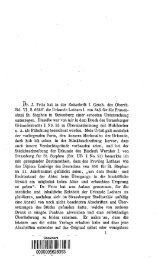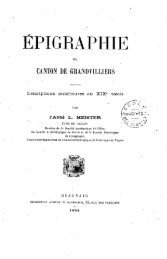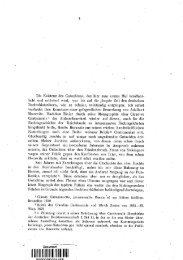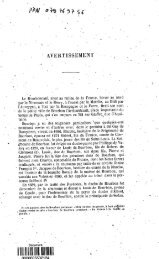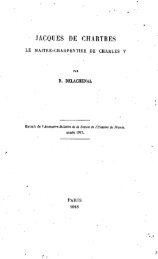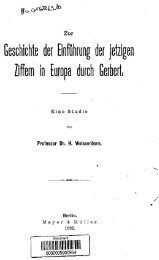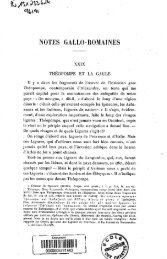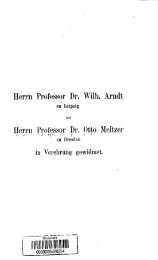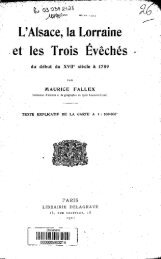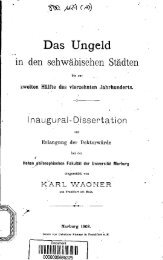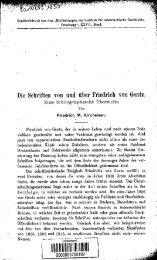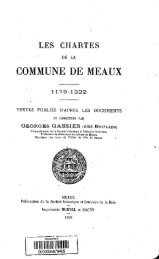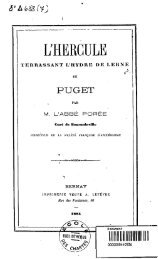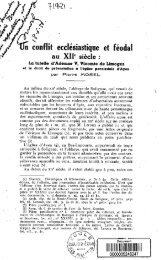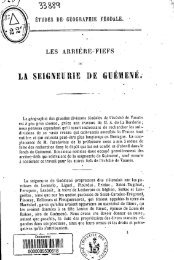4P Li gç(' TRANSACTIONS
4P Li gç(' TRANSACTIONS
4P Li gç(' TRANSACTIONS
You also want an ePaper? Increase the reach of your titles
YUMPU automatically turns print PDFs into web optimized ePapers that Google loves.
VOL. 47, ?T. 5, 19571 ORESME'S VERSION AND ENGLISH TRANSLATION 833<br />
T. Adonques seront it faiz bons aussi comme a bon<br />
droit ou a bonne cause; et se it ne obtiennent ceste<br />
chose, it souffreront deffaute.<br />
G. Cc peut estre entendu des enfans qui avroient deffaute<br />
de sens et de bonnes incurs se it ne estoient chastiés<br />
en ,joennece. Car si comme it appert par le premier<br />
chapitre du secunt d'E!/iiques, tres grande difference a de<br />
soy acoustumer a une chose en joennece on autre. Et<br />
de cc depent toute la vie, Et pour cc (lit Ic Sage: Fuji<br />
tibi sunt; erudi illos et curva illos a preniicia illoruni. Len<br />
doit enseigner ses filz et chastier des ]cur enfance et mesniement<br />
car it sunt ignorans. Et pour cc dit le Sage:<br />
Stulticia colligata est in corde pueri et virga discipline<br />
fugabit earn. L'en les fait sages par discipline. Et oveques<br />
cc, it sunt enchns a mal scion FEscripturc qui dit : Sensus<br />
enim et cogitacio cordis huniani prona sunt ad nialum ab<br />
adolescencia sua. Item, Ic texte pent estre 1 exposé: des<br />
parens qui avront deffaute en leur viellece, se au commencement<br />
it entreduissent leur enfans teicment qu'il devi-<br />
/ (342b) ennent malvés ; cal' miex vault mourir sans enfans<br />
que lessier les maivés, scion cc que (lit le Sage: Utile est<br />
mon sine tiliis quam relinquere filios impios. Et donques<br />
les parens doivent enduire 1 les enfans a bien par bonne<br />
discipline. Apres it met comme it doivent cc faire par<br />
example.<br />
T. Car se les parens ne clonnent a icur enfans example<br />
de bonne vie, ii pourront avoir, cc est a dire,<br />
prendre pure et excusable cause vers leur parens.<br />
G. It sc cxcuseront de cc qu'il ne sunt bons; car les<br />
enfans prennent garde a icur parens et ensuient volentiers<br />
leur fais: Patrem sequitur sua proles. Et Uen dit coinniunelment:<br />
Tele est la mere, tele est la fi]le. Item, it se<br />
excuseront de aidier as parens qui ont esté negligens de<br />
les nourrir a droit, combien que, par aventure, ces causes<br />
ne les excusent pas du tout scion verité, mes selon apparance.<br />
T. Et doivent lez parens avoir paourque finablement<br />
leur filz ne les aient en despit et que it ne soient cause<br />
de ]cur destruction ou mort parce qu'iI ne vivent pas<br />
bien.<br />
G. Cc peut cstre exposé des filz qui seront cause (le la<br />
mort des parens; car it ne leur vouldront secourir en leur<br />
villece pource qu'il seront nialvés. item, cc peut estre<br />
exposé des parens, car Ia malice de leur vie et de ]cur doctrine<br />
est souvent cause de Ia mort des enfans. Et de cc<br />
recite ici Barthelem y de Bruges que un que Yen nienoit<br />
pendre requist que ii baisast sa mere et lui esrasa Ic nes<br />
as dens, 2 en disant que die estoit cause de sa mort. Et<br />
I'Escripture (lit que les filz se complaignent du pere felon<br />
Dc pa- // (342c) tre impio qucruntur 1 !ilii. Apres it<br />
conclut.<br />
T. Et pour cc, it appartient an niari qu'il ne lesse ou<br />
trespasse rien qui face a Ia doctrine (IC sa femme, afin<br />
que jouxte ]cur possibilité it puissent procreer et engendrer<br />
enfans aussi comme de tres bons parens.<br />
G. Car si comrne it appert par Ic sixte chapitrc du<br />
premier de I'olitiqucs, comniunelment de boils parens viennent<br />
bons enfans, Ft donques Ic niari doit avoir solicitude<br />
et cure que sa fenlnie soit bonne. El cc prove Aristote<br />
apres par la tierce raison.<br />
T. Then they will grow up virtuous as they rightly<br />
should. And if the parents do not obtain this result,<br />
they will be the losers.<br />
G. This can he understood to refer to those children who<br />
might lack intelligence or good habits if the y were not<br />
thoroughly disciplined in their youth. For, as stated in<br />
Ethics II, 1, there is a great difference in growing accustomed<br />
to one thing or to another ill one's youth. And<br />
the entire life is affected by this, thus Solomon says<br />
"Have you sons, correct them and guide them from their<br />
childhood" [Ecclicus 7: 25]. One should instruct and discipline<br />
his children from infancy, especially because they<br />
are ignorant. And Solomon says: 'Foolishness is bound<br />
in the heart of a child; but the rod of correction shall drive<br />
it far from him" [Pros'. 22: 15]. Discipline makes them<br />
well behaved. Children are, moreover, inclined to evil,<br />
as the Scripture says-: For the imagination of man's heart<br />
is evil from his youth" [Gen. 8: 21]. The text may be<br />
explained as referring to parents, who will be needy in<br />
their old age if, at the beginning, they educate their children<br />
in such manner that they become / ( 342b) wicked.<br />
For it is better to die childless than to leave wicked children<br />
behind, as Solomon states: "It is better to die childless<br />
than to leave an impious posterity" [Ecclicus 16: 41.<br />
Therefore, parents should train their children by good<br />
discipline. Next he shows how parents must accomplish<br />
this by their example.<br />
T. If the parents (10 not offer their children the example<br />
of a good life, these latter ma y in their turn find<br />
good and sound cause to mistreat their parents.<br />
G. They will discover an excuse to explain why they<br />
are not good. For children observe their parents and<br />
readily follow their example: "The offspring follows its<br />
father" [Latin proverb]. And there is a common saying:<br />
<strong>Li</strong>ke mother, like daughter. They will refuse to help the<br />
parentswho have neglected to care for them properly even<br />
though this is perhaps no satisfactory excuse in actual<br />
truth, but only in appearance.<br />
T. And parents must fear lest in the end their children<br />
despise them and cause their destruction or death<br />
because of their evil manner of living.<br />
G. This can be interpreted to refer to the children, who<br />
will cause their parents' death since the children, because<br />
of their evil ways, will not be willing to help their parents<br />
in their old age. Or it may refer to the parents, since<br />
their evil ways are often the cause of their children's death.<br />
And at this point in his commentary, Barthélemy of Bruges<br />
tells the story of a man who was being taken to be hanged.<br />
He begged to be allowed to kiss his mother and he bit off<br />
her nose with his teeth, saying that she was the cause of<br />
his death. And Scripture says that the children complain<br />
about a wicked father: "A godless father do the // (342c)<br />
children curse" [Ecclicus 41: 10]. Now he concludes.<br />
T. Therefore it is the husband's business to leave<br />
nothing undone to assure his wife's training, so that, to<br />
the extent of their powers, they may together raise up<br />
their children as good parents should.<br />
G. As appears in Politics I, 2 [1255b 2], good parents<br />
generally produce good children. Therefore, the husband<br />
must exercise great care that his wife is a good wife. And<br />
Aristotle proves this by his third argument.<br />
t<br />
vp.. t<br />
c



